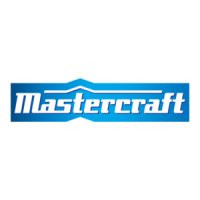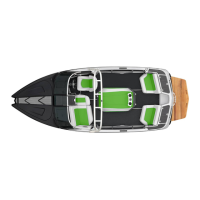2017 OWNERS MANUAL / 438
Check for leaks in the brake lines and fittings. Leaks will lead to loss
of trailer braking ability. Present the trailer to an authorized Master-
Craft dealer for repair if lines or fittings appear to be leaking.
Aluminum wheels also require attention to routine maintenance,
particularly in keeping them clean. Failure to do so may result in
damage that is not covered by warranty.
The trailer and wheels should be washed weekly during boating
season, and after every use if the trailer has been submerged in
salt or brackish water. Use a soft brush, mild detergent and/or mild
degreaser. A quality spray-on wheel cleaner may also be used.
Ensure that any product used is specifically indicated for use on
aluminum. (Many cleaners are too harsh and will result in pitting or
other damage to the wheel surface.) Many car washes use strong
chemicals and should be avoided when that is the case. Removing
road film, contaminants and brake dust (all of which retain mois-
ture) is critical to ensuring that the wheels will retain their luster and
quality finish for a long period of time. Any exposure to a hard winter
climate, particularly road salt and/or chemicals, requires immediate
cleaning the same as submersion in salt water.
NEVER CLEAN HOT WHEELS.
Allow wheels to cool or cool them with running water. If the wheels
are too hot, significant damage can occur to the wheels. It is also
important to seal the wheels with a sealant that reduces static
and resists brake dust. Check at an automotive supply store for an
appropriate sealant.
Maintenance
NOTE: Failure to follow these routine procedures may result in fail-
ures that are not covered under warranty.
Failure to follow maintenance procedures as outlined in this Own-
er’s Manual may result in component failure. Such failure is not
covered under warranty. Failure may also result in loss of control
or other malfunction that could potentially lead to serious injury or
death!
Hose o the brake rotors and calipers, along with all other parts of
the trailer that have come in contact with salt water or brackish wa-
ter, as this will minimize corrosion. A fresh water flush of the system
is the most critical aspect of trailer maintenance.
Extremely thick, heavy rust on rotor surfaces will not allow the wheel
assembly to rotate freely, resulting in heat build-up and premature
wear on components. Clean or replace components as necessary.
Brake pads must be replaced when 3/32” (.094”) or less of the pad
friction material is left.
Before Initial Use
Read this entire Owner’s Manual completely.
Before Every Trip
• Ensure that all vehicle and trailer maintenance has been per-
formed as set out in this Owner’s Manual and the various other
manuals, including the tow vehicle’s owners manual.
• Verify that the tongue weight and load are within proper specifi-
cation. Further, be sure that the load distribution is correct so that
the tow vehicle and trailer are properly balanced front-to-back and
side-to-side.
• Check the brake fluid reservoir to ensure it has the proper fluid level.
• Examine the brake rotor surfaces and remove excessive rust,
flushing the brakes if the trailer has been idle for an extended
period of time or submerged in salt water and not flushed after-
wards.
• Examine the actuator for wear, bent parts, corroded/seized parts
or other damage.
• Test the actuator to verify the brakes are working prior to use.
• Verify all running lights and brake lights, turn signals and hazard
lights, are working properly and that all wiring is properly connected.
The wire harness must not be touching the road, but loose enough
to make turns without disconnecting or damaging the wires.
Brake pad replacement should be performed by an authorized
MasterCraft dealer. Improper pad replacement may decrease
braking eectiveness, potentially resulting in a collision as a result
of failure to stop the tow vehicle within an acceptable distance.
Rotors should be resurfaced by a qualified brake specialist if ex-
treme galling or wear marks are present.
Worn rotors must be replaced. Failure to do so may result in brake
failure, which may cause serious injury or death.
Be certain that hydraulic fluid is clean and the fluid level is within
1/8” from the bottom of the threads on the reservoir plug. (See the
Actuator and Axle information contained in this section of the Own-
er’s Manual.) Do not fill beyond that level. Brake systems use DOT 3
(preferred) or DOT 4 hydraulic fluid.
DO NOT USE DOT 5 BRAKE FLUID. DOT 5 FLUID WILL DAMAGE THE
SEALS IN THE ACTUATOR AND CALIPERS, CAUSING FAILURE OF
THE BRAKES THAT COULD LEAD TO INJURY OR DEATH.
NOTE: Care must be taken to avoid brake fluid coming in contact
with the trailer paint. Brake fluid will damage paint! Such damage
is not covered under warranty!
